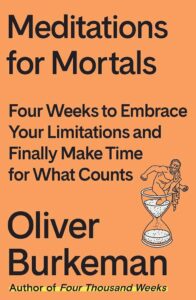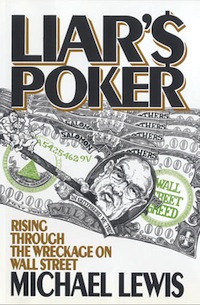This week’s selected media, December 15, 2024: Meditation for Mortals and Liar’s Poker
This week I finished:

Meditation for Mortals: Four Weeks to Embrace Your Limitations and Make Time for What Counts, by podcast guest Oliver Burkeman: I loved his book Four Thousand Weeks and I loved this book. I see it describing how to look at and respond to our culture and my life without getting caught up in its pressure to make me feel like I’m not enough, that I don’t have enough time, that a better life, or real life, is in the future.
We’re living now. We can’t do everything, see everyone, visit every place, solve every problem, and so on. We never could. On the contrary, those limitations are part of reality. Acknowledging them isn’t admitting defeat. It increases self-awareness. Deciding to choose what I do deliberately makes life meaningful. I focus on what I value and stop becoming drawn everywhere, losing my self.
I’m skeptical when people read something and say they knew it already, so I’m skeptical about myself in that I feel I found most of what he wrote about, except instead of through his practicing self-help and related literature for a column, I found it through sustainability (also self-help and leadership literature before then).
I’m not that skeptical, though, owing to how much we saw eye-to-eye in our conversation on my podcast. Either way, I haven’t seen all of what he wrote compiled, edited, and made enjoyable to read, which adds value.
I recommend this book.
Liar’s Poker, by Michael Lewis: I read this book because I enjoyed reading last week’s Big Short and wanted to read something else by the author.
I forget which did it, but one of his books reminded me that I learned about collateralized debt obligations (CDOs), mortgage backed securities, synthetic CDOs, and so on in business school. I was in school 2005-06, so it was just before the 2008 meltdown. As I recall, the school viewed them as wonderful ways to lend money to people and projects that otherwise couldn’t have been funded. I don’t remember them suggesting they might create perverse incentives or risk.

According to Wikipedia: “In the early 2000s, the debt underpinning CDOs was generally diversified, but by 2006–2007—when the CDO market grew to hundreds of billions of dollars—this had changed. CDO collateral became dominated by high risk (BBB or A) tranches recycled from other asset-backed securities, whose assets were usually subprime mortgages. These CDOs have been called ‘the engine that powered the mortgage supply chain’ for subprime mortgages, and are credited with giving lenders greater incentive to make subprime loans, leading to the 2007–2009 subprime mortgage crisis.”
It looks like I could have had an inside view on a disaster if I had pursued that line of study.
Read my weekly newsletter

On initiative, leadership, the environment, and burpees